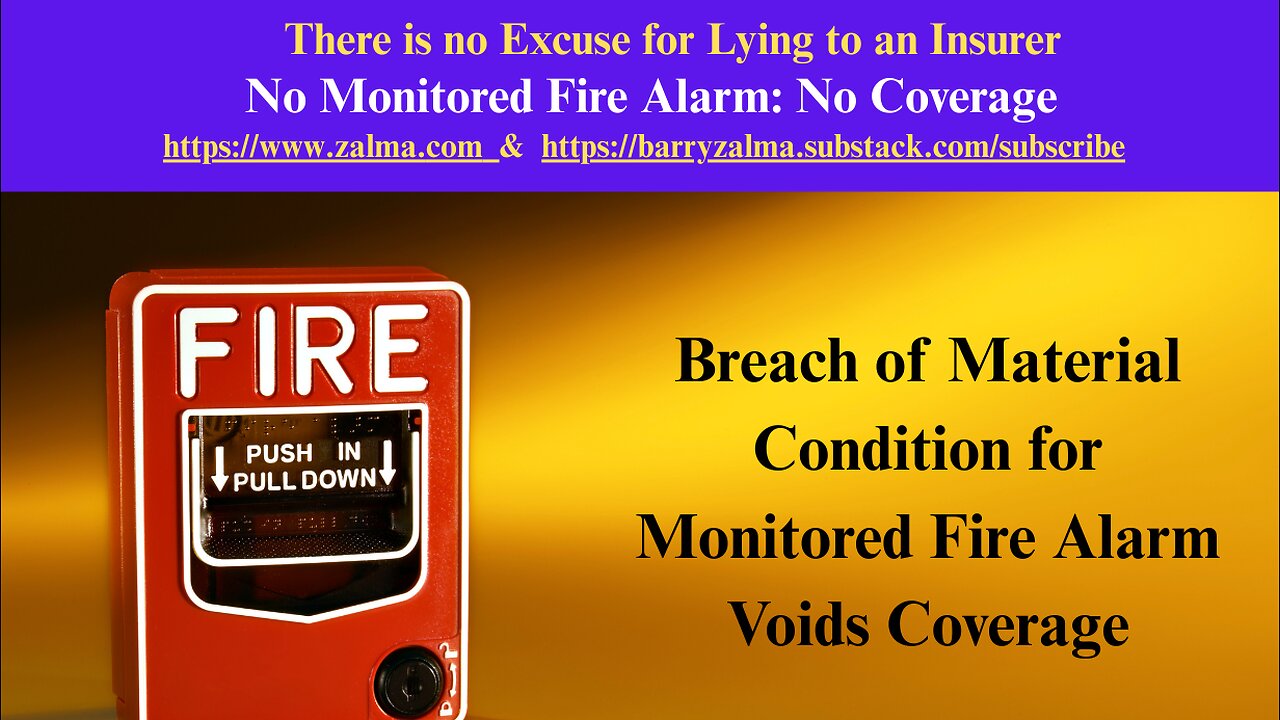Premium Only Content

There is no Excuse for Lying to an Insurer
No Monitored Fire Alarm: No Coverage
Post 5191
Breach of Material Condition for Monitored Fire Alarm Voids Coverage
In Northfield Insurance Co. v. Michigan 32, LLC, No. 24-CV-12822, United States District Court, E.D. Michigan, Southern Division (September 10, 2025) Defendant Michigan 32, LLC's (MI 32) moved the court for reconsideration of the Court's Opinion and Order granting summary judgment to Plaintiff Northfield Insurance Company (Northfield).
The matter arose out of a commercial insurance coverage dispute wherein Northfield denied MI 32's fire loss claim. The Court granted summary judgment in favor of Northfield on its Declaratory Judgment action.
THE ORIGINAL DECISION
The Protective Safeguard Endorsement
The Court held that MI 32's admitted failure to comply with its Policy's Protective Safeguard Endorsement (“PSE”), requiring that the insured building be protected by a centrally-monitored fire alarm, which was a condition precedent to coverage, precluded coverage for the fire loss under the PSE terms and fire loss exclusion. Second, the Policy was void ab initio where it was issued in reliance on MI 32's undisputed material misrepresentations in its application, i.e., that it had an ADT-monitored fire alarm when its principal later admitted it never did. MI 32 now maintains the Court granted Northfield's motion without addressing MI 32's waiver and estoppel defenses.
The Motion for Reconsideration
The local rules of this district no longer allow a party to file a motion for reconsideration of final orders or judgments. Motions to alter or amend judgment pursuant to Rule 59(e) may be granted only if there is a clear error of law, newly discovered evidence, an intervening change in controlling law, or to prevent manifest injustice. While Rule 59(e) permits a court to alter or amend a judgment, it may not be used to relitigate old matters, or to raise arguments or present evidence that could have been raised prior to the entry of judgment.
Rule 60(b) allows a court to relieve a party from a final judgment, order, or proceeding for the following reasons:
mistake, inadvertence, surprise, or excusable neglect;
newly discovered evidence that, with reasonable diligence, could not have been discovered in time to move for a new trial under Rule 59(b);
fraud (whether previously called intrinsic or extrinsic), misrepresentation, or misconduct by an opposing party;
the judgment is void;
the judgment has been satisfied, released, or discharged; it is based on an earlier judgment that has been reversed or vacated; or applying it prospectively is no longer equitable; or
any other reason that justifies relief.
In its response to Northfield's motion for summary judgment, MI 32 argued that Northfield waived, or should be estopped from asserting, coverage preclusion or policy rescission because Northfield knew or should have known that MI 32 did not have an automatic fire alarm system. One basis of Northfield's alleged knowledge was an August 25, 2022 phone conversation between MI 32's principal and Traveler's Risk Control Consultant Melissa Ellison, characterized by MI 32 as an “inspection,” which took place months after the Policy was issued.
ANALYSIS
The Court expressly found that MI 32 produced no evidence to contradict the Northfield underwriter's affidavit attesting to the fact that Northfield did not know there was no automatic fire alarm system at the subject property when it issued the policies, and that it would not have issued the polices to MI 32 had it known.
The Court did not commit a clear error of law, or a manifest injustice, nor is there any basis to conclude that this an “unusual and extreme situation[] where principles of equity mandate relief.” MI 32 fails to satisfy its burden under Rule 59(e) or 60(b) and merely rehashes arguments contained in its responsive pleading that were already considered by the Court.
Defendant's motion for reconsideration or rehearing was DENIED.
ZALMA OPINION
The covenant of good faith and fair dealing implied in all insurance contracts applies equally to the insured as it does to the insurer. In this case the insured blatantly lied on its application for insurance that it had a monitored fire alarm system that, after the fire, the insured admitted there was no alarm. The policy could have been rescinded for that lie and the endorsement, a condition precedent to coverage, eliminated the coverage. Therefore there was no coverage either way and the motion for reconsideration was a waste of time.
(
c) 2025 Barry Zalma & ClaimSchool, Inc.
Please tell your friends and colleagues about this blog and the videos and let them subscribe to the blog and the videos.
Subscribe to my substack at https://barryzalma.substack.com/subscribe
Go to X @bzalma; Go to Barry Zalma videos at Rumble.com at https://rumble.com/account/content?type=all; Go to Barry Zalma on YouTube- https://www.youtube.com/channel/UCysiZklEtxZsSF9DfC0Expg; Go to the Insurance Claims Library – https://lnkd.in/gwEYk.
-
 9:38
9:38
Insurance Law
4 days agoEvidence Established that Rudolf Murdered His Wife in Africa
162 -
 LIVE
LIVE
Steven Crowder
3 hours ago🔴 The Lies are Sick: Charlie Kirk's Legacy Separating Fact from Fiction
32,611 watching -
 UPCOMING
UPCOMING
Sean Unpaved
52 minutes agoMNF Mayhem: Bucs' Stunner, Brady's Booth Drama, Shedeur's Draft Doge & the Masters on Prime
3 -
 1:07:59
1:07:59
NotTheBee
1 day agoOur Memories Of Charlie Kirk And What This Means For The Country
34.8K22 -
 1:19:51
1:19:51
The Rubin Report
2 hours agoListen to the Fear in Whoopi Goldberg’s Voice on 'The View' as She Gives a Chilling Warning
39.5K30 -
 UPCOMING
UPCOMING
Rebel News
11 minutes agoLibs blame Poilievre, Cons call to scrap TFW program, Carney on Canada-US relations | Rebel Roundup
-
 LIVE
LIVE
The Mel K Show
1 hour agoMORNINGS WITH MEL K - Constitution Incompatible with Globalist Goals 9-16-25
845 watching -

Grant Stinchfield
1 hour agoRFK Jr. Speaks Out: The Pain of Assassination & the Loss of Charlie Kirk
850 -
 1:59:33
1:59:33
Benny Johnson
3 hours agoKash Patel Testifying LIVE Now on Charlie Kirk Assassination, Trump to Declare Antifa TERRORISTS?!
72.5K53 -
 2:07:38
2:07:38
Timcast
4 hours ago🚨LIVE: Kash Patel Testifies Over Charlie Kirk Assassination In Senate | Tim Pool
82.9K55